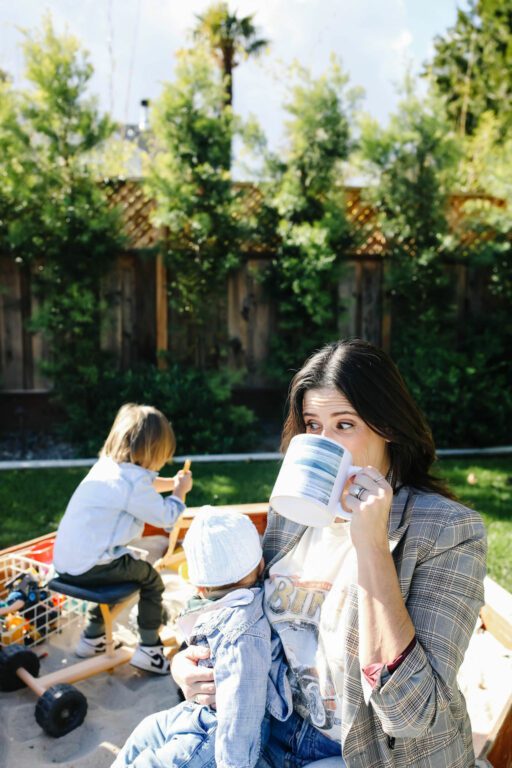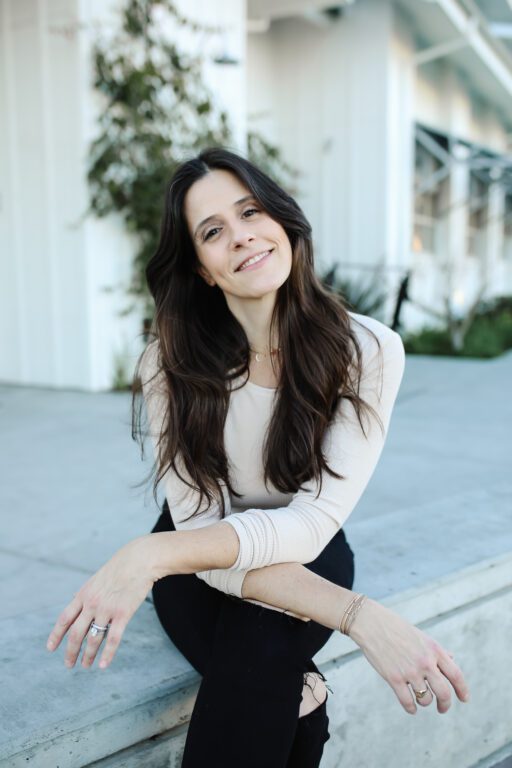Did you miss the possibility to hit the mat at present as a result of your parenting duties? Sarah Ezrin means that for those who’ve been caregiving, you’ve accomplished your yoga. In honor of the discharge of her new ebook, The Yoga of Parenting (Shambhala, 2023) Sarah Ezrin has shared a free lecture on Wanderlust TV that claims that for those who have been within the parenting function as an alternative of pigeon pose, you have been nonetheless doing yoga. We’ve excerpted a chapter of the brand new ebook under, and you’ll peep our author’s overview of the ebook right here.
Boundaries for Breakfast
I begin setting boundaries from the second my alarm goes off within the morning. Boundaries are available all shapes and types. I believe many people assume that boundaries are simply one thing we set with one other individual or how a lot of our private lives we share with the world (consider the saying “That individual has no boundaries”), however most days, earlier than the solar even begins to rise, I’ve already set boundaries with myself, my husband, my youngsters, my work, my household, my buddies, and even our canine.
Setting boundaries is a approach to defend my most valuable useful resource: my vitality—each how and the place it’s being spent. They’re a manner for me to mitigate how a lot of myself I’m giving to one thing or somebody since my impulse is to offer everybody and every thing my all. And they’re continually shifting. Simply because I really feel a method at present or have to focus my consideration in a single space doesn’t imply that I’ll really feel the identical tomorrow. Simply because I really feel the necessity to attract a tough line this month or, conversely, be completely free about one thing, doesn’t imply I’ll do it that manner once more subsequent month.
The very first boundary I set most days of the week is making the selection to get up properly earlier than the remainder of the world so I can meditate and write. It’s a boundary I set with myself but in addition with others, in that it means I am going to mattress a lot sooner than most and am not typically out there for any exterior obligations early within the mornings, together with emails or work conferences. Getting up early provides me time to fill my cup, each actually, as in attending to take pleasure in my tea scorching (which is unattainable as soon as my youngsters are awake), and metaphorically, in that I spend these wee hours of the morning doing no matter I wish to do. I write. I sit quietly. I cuddle with my canine (although as talked about, there are a lot of mornings I even have say to him, “Not now, dude. I want a bit of area.”).
Having the ability to focus fully on every of these items with out distraction or different individuals needing me transforms every job right into a ritual. I might even dare to say that they grow to be my yoga observe, my sadhana. Discover that no mat is required. However simply because my morning time is particular doesn’t imply that I’m beholden to it. Actually, I’m far more forgiving with myself than I used to be years prior.
For a few years in early maturity, my boundaries with myself have been extremely inflexible. It started in early school round my research and consuming and shortly bled into each different space of my life. Even once I began to get “more healthy,” as in training yoga, my self-discipline bordered on masochism. I might pressure myself by means of hard-core asana practices, no matter if I had the vitality. I might withhold any pleasure from myself within the type of meals and even relationships. In prioritizing my physique’s dimension, asana observe, and profession, I ended up denying myself the enjoyment of residing.

 Sarcastically, throughout that very same time, the boundaries I held with different individuals appeared nearly nonexistent. I might soak up my relations’ ache and struggles and insert myself into everybody’s issues. There was a cause I pursued psychology for so long as I did, together with starting to get my Masters Diploma in marriage household remedy: I assumed it was my job to “repair” everybody. I might additionally say sure to commitments that I knew in my coronary heart I didn’t wish to fulfill, prioritizing others’ disappointment over my very own psychological well being. Between my terribly sturdy private boundaries and extremely porous social boundaries, there was little to no steadiness.
Sarcastically, throughout that very same time, the boundaries I held with different individuals appeared nearly nonexistent. I might soak up my relations’ ache and struggles and insert myself into everybody’s issues. There was a cause I pursued psychology for so long as I did, together with starting to get my Masters Diploma in marriage household remedy: I assumed it was my job to “repair” everybody. I might additionally say sure to commitments that I knew in my coronary heart I didn’t wish to fulfill, prioritizing others’ disappointment over my very own psychological well being. Between my terribly sturdy private boundaries and extremely porous social boundaries, there was little to no steadiness.
Since beginning a household, I’ve tried to swing myself within the actual wrong way. These days, I attempt to be softer with the boundaries I maintain round myself however tighter with the boundaries I’ve round others. I discover this steadiness to be extra sustainable when I’ve individuals counting on me 24/7. For instance, I’ll permit myself to sleep previous my alarm if I have to and skip my asana observe if I’m exhausted (one thing I might not have dared to do a decade in the past!). I’m far more keen to attract a tough line and say no when requested to do one thing for somebody that doesn’t really feel genuine. My two new favourite phrases are “Google it.”
Wholesome boundaries reside, respiratory issues. They exist alongside a spectrum as a result of we at all times want to regulate somehow to search out new methods to steadiness. There are some durations in our lives when our boundaries should be agency, others the place they should be extra malleable.
Can we be current and conscious sufficient of what we want proper now on this second to know when to make these changes?
When an Overachiever Turns into a Guardian
As I implied earlier, my yeses and nos have at all times been a bit backward on the subject of differentiating my private life from my work life. Simply earlier than I met my husband, I used to be so burned out and overworked that my well being was affected. I might binge and purge each weekend after which limit and overexercise all week (and that is once I was “wholesome”). I might go months and not using a time off, unable to say no. Typically I might educate a category simply minutes after main life occasions, like deaths within the household or breakups, barreling by means of the extraordinary feelings with work as an alternative of taking the time to course of.
When an damage prevented me from not solely instructing asana but in addition training it (the 2 issues I had rigidly come to outline my whole life by), issues started to melt for me. First, my damage was so dangerous that I needed to pull out of some work commitments, one thing I had by no means accomplished in my whole instructing profession at that time. For a people-pleaser, my work commitments are like blood oaths. Certainly my saying no would destroy my profession and I might lose any new alternatives and by no means journey for instructing once more.
Spoiler alert: none of that got here true.
As an alternative, fast-forward to seven years later: I’m fortunately married with two lovely boys, and I can actually say that in studying steadiness what I say sure to and no to, my profession has been capable of thrive proper alongside my household.
Would I be deeper into my leg-behind-the-head poses had I stored prioritizing my asana over my relationships and creating a household? Presumably, however I might not commerce new child and toddler cuddles for shoving my leg behind my head for something.
No will not be a Dangerous Phrase
It’s not simple, studying say no to these you like probably the most. Some mind researchers say that we’re hardwired to affiliate the phrase with negativity and that reverse components of the mind fireplace when listening to no versus sure. I do know many dad and mom who attempt to by no means say the phrase to their youngsters. I attempt to set constructive limits in different methods, for instance, by acknowledging what my youngsters can do or explaining why one thing could not work proper now, versus simply saying no outright. They are saying a toddler hears no 4 hundred occasions a day, so I get the hesitation, however could I counsel one thing maybe a bit controversial?


What if saying no will not be essentially a foul factor? What if saying no is a necessity? What if we might retrain our mind to grasp that saying no is de facto saying sure to one thing else? Most frequently your self? As Anne Lamott sums up in her hilarious and uncooked ebook Working Directions: A Journal of My Son’s First Yr, “‘No’ is a whole sentence.” The creator and activist Glennon Doyle additionally defined this properly in a latest episode of her We Can Do Laborious Issues podcast, saying {that a} huge a part of mitigating one’s tendency to people-please is “having the mental honesty to know that each ‘sure’ is a ‘no’ and each ‘no’ in a ‘sure.’”
That is completely true for me. After I’m saying sure to please everybody else, I’m finally saying no to my very own wants. This then leads me to really feel overwhelmed and overcommitted. My work suffers and my relationships undergo when my self-care suffers.
Our youngsters additionally study boundaries by means of our modeling—each set them and disrespect them. I’m already seeing clear proof that my eldest, Jonah, at the same time as a toddler, is requesting to set his personal boundaries, and I work arduous to respect these. For instance, when now we have individuals go to or we go stick with household, he (very similar to me) loses steam after a number of days in and desires a break from all of the social engagements. When he couldn’t converse but, he would inform me by needing fixed contact with me, performing far more relaxed when mendacity collectively quietly in a darkish room versus when he was the focus (that a part of him will not be like me). Now that his verbal expertise are higher developed, he actually asks to remain in mattress some days or to remain residence versus going out someplace or being round different individuals.
Can we respect our kids’s boundaries after they request them? Can we take no as a whole reply after they don’t wish to do one thing now we have requested them to do? Like bodily affection towards a member of the family, consuming sure meals, or not desirous to go someplace we had deliberate for them? The place is the road between setting your personal limits and listening to your little one’s wants?
That is the place the connection piece of empathic parenting is available in. If we’re in tune with our little one’s wants, then we will gauge on that individual day and in that individual second if we’re capable of acquiesce; or if it occurs to be a day when our little one is simply being unnecessarily tough to evaluate, what/if any restrict must be set and enforced. Bear in mind to return to the entire expertise we honed partly one of many ebook, corresponding to turning into delicate to life-force vitality (each yours and your little one’s). Observe grounding in your physique and/or breath. Observe the fluctuations of your nervous system. Bear in mind that anyone of those easy actions (if not all) can assist us grow to be extra linked with our kids and subsequently be clearer on what our kids actually want, so we will say sure to their no.
From The Yoga of Parenting by Sarah Ezrin © 2023. Reprinted in association with Shambhala Publications, Inc. Boulder, CO.
—

 Sarah Ezrin is an creator, world-renowned yoga educator, and content material creator primarily based within the San Francisco Bay Space, the place she lives together with her husband, two sons, and their canine. Her willingness to be unabashedly sincere and susceptible alongside together with her innate knowledge make her writing, lessons, and social media nice sources of therapeutic and inside peace for many individuals. Sarah is a frequent contributor to Yoga Journal and LA Yoga Journal in addition to for the award-winning media group, Yoga Worldwide. She additionally writes for parenting websites Healthline-Parenthood, Scary Mommy, and Motherly. She has been interviewed for her experience by the Wall Avenue Journal, Forbes Journal, and Bustle.com and has appeared on tv on NBC Information. Sarah is a extremely accredited yoga trainer. A world traveler since start, she leads trainer trainings, workshops, and retreats regionally in her residence state of California and throughout the globe.
Sarah Ezrin is an creator, world-renowned yoga educator, and content material creator primarily based within the San Francisco Bay Space, the place she lives together with her husband, two sons, and their canine. Her willingness to be unabashedly sincere and susceptible alongside together with her innate knowledge make her writing, lessons, and social media nice sources of therapeutic and inside peace for many individuals. Sarah is a frequent contributor to Yoga Journal and LA Yoga Journal in addition to for the award-winning media group, Yoga Worldwide. She additionally writes for parenting websites Healthline-Parenthood, Scary Mommy, and Motherly. She has been interviewed for her experience by the Wall Avenue Journal, Forbes Journal, and Bustle.com and has appeared on tv on NBC Information. Sarah is a extremely accredited yoga trainer. A world traveler since start, she leads trainer trainings, workshops, and retreats regionally in her residence state of California and throughout the globe.
